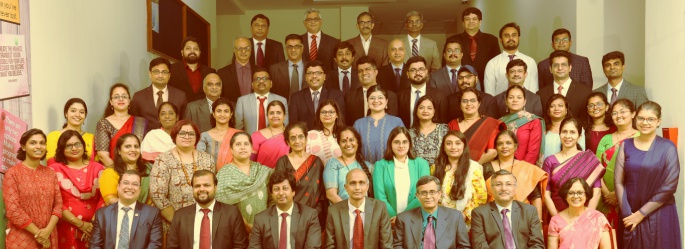‘MBAs need to dip into many disciplines to solve unstructured problems’
Publication: The Hindu Businessline
Author: Prof. Madhu Veeraraghavan
TA Pai Management Institute (TAPMI), a constituent unit of the Manipal Academy of Higher Education (MAHE), was established in 1980 and is among top B-schools in India. In this interview, Prof Madhu Veeraraghavan, Executive Director (Management Studies) of MAHE, and Director of TAPMI, discusses his plans to take the TAPMI brand to new heights. Excerpts:
What plans do you have for management education in MAHE and TAPMI?
TAPMI is launching a BBA (hons) at the new campus in Yelahanka, Bengaluru. We are not introducing an MBA programme there. We are not bringing in a BBA programme in Manipal. We have separated it. The Department of Commerce of MAHE will be offering the BCom and MCom at the Bengaluru campus. TAPMI will not offer BCom and MCom.
Quality education for all management students in MAHE and research thrust for faculty will be the focus areas. I want to build up executive education in Bengaluru, especially for TAPMI, because we have a very strong executive education here in Manipal.
Did international accreditations helpe you get better quality for students/faculty?
MAHE is an Institute of Eminence. TAPMI is among the five B-schools in India accredited by the Association to Advance Collegiate School of Business (AACSB) and the Association of MBAs (AMBA). Definitely, accreditation helps. It is a seal of approval from the external body that says we are doing quality work. It also is positive reinforcement for new faculty.
I tell students to go by whether the B-school is accredited. If the school is accredited, every aspect of it has been tested by the accrediting body. An accredited school opens up a number of doors for a student.
Definitely, rankings are important, but the methodology is always different from one agency to another. AACSB and AMBA are very clear and you have to comply with the standards.
Apart from accreditation, why should a student come to TAPMI?
My suggestion to aspirants is to look at the faculty profiles; today TAPMI faculty go to Harvard Business School to get trained.
Students should look at what industry connections a B-school has. Do I get to an international network with outstanding corporate professionals? Another important point to consider is how updated the curriculum of the school is. Many top B-schools around the world, including TAPMI, had to change the way curriculum was structured, post-Covid.
A B-school will stop becoming relevant if it is not ahead of the curve. A majority of graduates coming from B-schools, at least in India, join the industry, and if we don’t have any connections with the industry, we should not be running a B-school.
Tell us more about BBA (hons) programme in Bengaluru.
Our Bengaluru campus will be delivering one of the best undergraduate programmes in the country, a four-year BBA (hons), fully consistent with NEP.
BBA has focused on sociology, anthropology, psychology, creative writing, foreign languages, data science, and scientific thinking. You may ask why all these? Because the problems of the world are unstructured. We will have to draw from multiple disciplines to solve these problems. You cannot strait-jacket and say learn more accounting, or economics, or finance.
Is there any plan to expand the network in other parts of the country, apart from Bengaluru?
No. I don’t think we will do that. A B-school in a city like Bengaluru is critical. Because you are exposed to a lot of companies and sectors, and the competitiveness is also different in a metro city like Bengaluru. MAHE has a beautiful 126-acre campus coming up.
What are the new courses being planned?
We have just launched an MBA (International Business), with an approved intake of 30 students. In Bengaluru, we are also planning a BBA in technology management. This is important because we don’t want to run a computer science programme. We want managerial aspects. Our focus is different.
It seems students are focusing more on placements. What plans do you have for entrepreneurship development among students?
Students should be creating jobs rather than simply taking jobs. What proportion of students who walk into a top school like TAPMI become entrepreneurs? I would say not even 20 per cent in the first five years. You know why? Because most of them take loans to come into an MBA programme. For these reasons, students work for five to eight years. They try to repay the loan as quickly as possible.
This is the year of innovation at MAHE. We have looked at over 100 TAPMIans running successful ventures. But many of them did not start in the first five years.
Do you think the location is a disadvantage for TAPMI-Manipal?
I think it is more of an advantage. Today, we deal with 300 corporate partners. If this were a disadvantage, companies and students will not come, and we would not have almost 40 batches passing through.
Manipal, which is seen as a student town, is a very large name in the education sector, and I don’t think we need to market Manipal to any corporate.
We have 1,000-odd students from 24-25 different states. Look at faculty. We have a diverse faculty from every possible state.
You see, here is a B-school in a panchayat, and you have an AACSB and AMBA. We do great work in sustainability. So location should not be a hassle, and it is not a hassle.
Are you getting more non-engineers to join your programme?
It has been better. I would like to see more and more non-engineers. But I think, in India, engineers coming to an MBA programme has been there for a long time. We certainly are focusing on getting more non-engineers. They bring in more diversity. There is so much more we can learn from each other.
Even in engineers, I would like to see more mechanical, civil engineers, and people who have worked on the shop floor. I think they bring in a very different experience.
What is the share of women in TAPMI?
It is around 37 per cent. We are actually wanting to see more than 40 per cent of women. In fact, we are working very hard to have more women come to TAPMI. That is the focus as well.
We want to see more women break the glass ceiling and head to corporates and become CEOs and CFOs. Even in the US, it’s a problem. Look at the top 500 companies. You will count the number of women CEOs on your fingers.
You mentioned research thrust. Can you please tell us more about that?
We are doing tremendous work in the area of corporate finance and corporate governance. When it comes to research, we are not a quantity-driven B-school. We are a school that purely focuses on quality publications and peer-reviewed journals.
This is a significant departure from what many B-schools have done, or even what we may have been doing before I took over in 2017. We are focusing largely on the quality of publications, one that has more citations or high-impact journals.
I am personally recommending professors to look at research that is practitioner-based. It must have implications for the practitioners as well.




